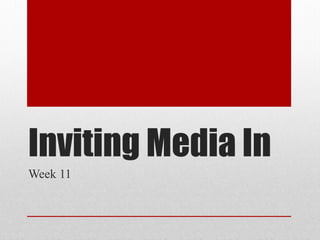Media Skills 2014: Week 11
- 1. Inviting Media In Week 11
- 6. âĒ Also referred to as a media or press conference, or media briefing âĒ Allows an organisation to give the same message to all relevant media, all at the same time âĒ Often used for âbigâ announcements, or for strategic impact, or for launches (and can be in conjunction with familiarisation tours e.g. ChCh EQ zone) âĒ The challenge is often getting the mediaâs attention and guaranteeing attendance (donât time your conference to clash with something else significant or a busy news time). The News Conference
- 7. âĒ Reach many media at once âĒ Minimise time & effort spent by your spokesperson giving interviews âĒ Minimise your costs in catering to journalistsâ needs by using economies of scale âĒ When control/timing of message is key (e.g. interest rate changes, disasters) âĒ To clear the air, set the record straight, diffuse a situation, or when thereâs a crisis Why a News Conference?
- 8. âĒ Invite all relevant media with an email âalertâ or âadvisoryâ (covering who, what, where, when, why) â sound interesting but donât over promise âĒ Ensure you have the right (senior) staff to act as spokespeople (ideally also available for one-on-one interviews afterwards) âĒ Consider the right environment for the conference content, and take care with logistics including parking âĒ If itâs breaking news, any realistic time is acceptable; if itâs routine, choose a convenient time that fits with the news cycle (to optimise attendance) â early in the week and before midday best âĒ A supporting media release should also be produced; perhaps a full media kit The Process
- 9. The MOST important thing to consider when planning a media conference is: âĒ WHY would the media want to come? âĒ WHAT will they get out of it that they wouldnât get from one-to-one, exclusive contact? âĒ SEE something that will only happen ONCE âĒ HEAR something that will only be said ONCE 9
- 10. âĒ A media release could do same job âĒ You donât have outstanding news âĒ You only have good or simple news (see point one) âĒ You donât want some things that havenât yet been uncovered to come to light, either on this topic or another topic about your client âĒ Your spokesperson cannot confidently and convincingly answer all questions or good talent is unavailable âĒ You could offer exclusives to get better targeted coverage Donât have a conference if: 10
- 11. âĒ Senior management or key personnel are required to âfrontâ a media conference (best if they are personable, good voice, well presented/mannered, quick-witted) âĒ Your role as a PR or media advisor is to prepare these people for the situation; to make a formal statement or announcement and to take journalistsâ questions âĒ Key messages should be concise, conversational and catchy (Johnston, 2007) Media Training
- 12. âĒ Media conferences can (and probably should) be streamed live online (and subsequently posted) â part of the shift towards âvisual PRâ âĒ Webcasting is cost effective and opens your conference up to a wider audience âĒ Webcasting gives you more âcontrolâ over all aspects of your message presentation (no editing); and is a useful contribution to an online media room (Breakenridge & DeLoughry, 2003) Webcasting
- 13. âĒ In your role as a PR/media liaison, you will be regularly interacting with and hosting journalists (and preparing/training other organisational staff to develop key messages and âfront upâ) âĒ Events like media conferences will run more smoothly if you have a positive professional relationship (though not a friendship!) with key media, and if spokespeople are well prepared âĒ See your Doorley & Garcia (2007) reading for more on reputational aspects Journo â PR Relationship
- 14. âĒ Next week is our last lectureâĶI will also talk about the exam then Donât Forget














